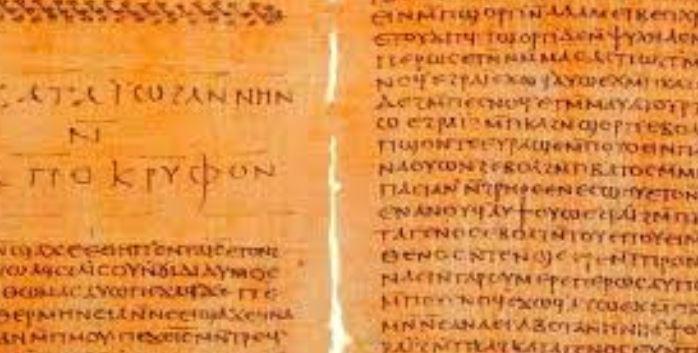Gospel of Thomas

The Gospel of Thomas is an ancient text that consists of 114 sayings (or logia) attributed to Jesus. It is one of the Nag Hammadi texts, discovered in 1945 in the desert of Egypt, as part of a larger collection of Gnostic writings. Unlike the canonical Gospels (Matthew, Mark, Luke, and John), the Gospel of Thomas does not contain any narrative of Jesus' life, death, or resurrection. Instead, it is focused entirely on his teachings.
The Gospel of Thomas is often considered a Gnostic text, though it does not strictly conform to all Gnostic principles. Its main themes are mystical and spiritual, emphasizing inner knowledge (gnosis) and self-awareness as a path to salvation.
Key Features of the Gospel of Thomas:
-
Sayings of Jesus:
-
The Gospel is made up of 114 sayings attributed to Jesus. Many of these sayings are similar to those found in the canonical Gospels, but others are unique. The teachings in the Gospel of Thomas often focus on inner spirituality, direct knowledge of God, and the need to discover the "kingdom of God" within oneself.
-
-
No Narrative or Biography:
-
Unlike the four canonical Gospels, the Gospel of Thomas does not tell the story of Jesus' birth, miracles, crucifixion, or resurrection. It is purely a collection of his words. This is part of what has led scholars to consider the Gospel of Thomas as representing a more mystical and philosophical tradition within early Christianity.
-
-
Focus on Knowledge (Gnosis):
-
A key feature of the Gospel of Thomas is the idea that salvation is attained through gnosis, or mystical knowledge, rather than through faith in Jesus' death and resurrection. In this text, the "kingdom of God" is seen as something that is discovered through personal inner experience, rather than something that exists externally.
-
One of the most famous lines from the Gospel of Thomas reflects this idea: "If you bring forth what is within you, what you bring forth will save you. If you do not bring forth what is within you, what you do not bring forth will destroy you" (Saying 70).
-
-
The Kingdom of God Within:
-
The Gospel of Thomas emphasizes that the kingdom of God is not a future event or a place to be reached after death but is something within each person. For example, Saying 3 states, "The kingdom is inside of you, and it is outside of you. When you come to know yourselves, then you will become known, and you will realize that it is you who are the sons of the living Father."
-
This teaching contrasts with the view in the canonical Gospels, where the kingdom of God is often depicted as a future event or a coming kingdom.
-
-
Non-Duality and Unity:
-
Some of the sayings in the Gospel of Thomas suggest a non-dualistic view of the world, where opposites like male and female, good and evil, are ultimately unified in a deeper spiritual reality. For example, Saying 22 says: "When you make the two one, and when you make the inside like the outside and the outside like the inside, and the male and the female into a single one, so that the male will not be male nor the female female... then you will enter the kingdom."
-
This suggests an understanding of spiritual wholeness where distinctions between opposites fade away in the presence of divine truth.
-
-
Ascetic and Mystical Elements:
-
While not as ascetic as some Gnostic writings, the Gospel of Thomas does contain elements that promote renunciation of worldly attachments and emphasize the need for inner transformation. The text encourages individuals to go beyond external religious practices and rituals to focus on self-knowledge and inner purity.
-
Some Notable Sayings from the Gospel of Thomas:
-
Saying 1: "Whoever finds the interpretation of these sayings will not taste death."
-
This suggests that the true understanding of Jesus' words leads to eternal life.
-
-
Saying 3: "The Kingdom is inside of you, and it is outside of you."
-
A profound statement about the internal nature of God's reign.
-
-
Saying 77: "I am the light that is over all things. I am the All. The All came from me, and the All reached its end in me."
-
This reflects a mystical vision of unity with the divine, echoing themes of light and oneness often found in Gnostic texts.
-
-
Saying 113: "His disciples said to him, 'When will the kingdom come?' Jesus said, 'It will not come by waiting for it. It will not be a matter of saying, "Here it is," or "There it is." Rather, the Kingdom of the Father is spread out upon the earth, and people do not see it.'"
-
This suggests that the kingdom of God is not something to be expected in the future, but something already present for those with eyes to see.
-
The Gospel of Thomas and Early Christianity:
The Gospel of Thomas is significant because it offers a window into a form of early Christianity that did not focus on the crucifixion and resurrection of Jesus as the central event for salvation. Instead, it centers on personal transformation and spiritual enlightenment. The Gospel is sometimes associated with Gnosticism, a broad religious and philosophical movement in the early centuries of Christianity that emphasized knowledge (gnosis) as the key to salvation, often through esoteric or mystical means.
The orthodox Christian church did not accept the Gospel of Thomas as part of the New Testament canon, and it was largely forgotten until its rediscovery in the 20th century. Its teachings, however, continue to intrigue modern scholars, spiritual seekers, and those interested in alternative interpretations of Christian theology.
Controversy and Exclusion from the New Testament:
The Gospel of Thomas was excluded from the New Testament canon by early church councils because it contained ideas that were considered heretical by the emerging orthodox Christian doctrine. It was in line with certain early Christian groups that held unorthodox views about the nature of salvation, knowledge, and the relationship between Jesus' teachings and the death/resurrection narrative. The Gospel's focus on personal, mystical experience of the divine was seen as incompatible with the broader Christian message of faith in the death and resurrection of Jesus.
Influence in Modern Times:
Since the rediscovery of the Gospel of Thomas, especially after the Nag Hammadi discovery in 1945, it has sparked renewed interest in early Christian mysticism and the alternative Christianities that were suppressed by the early Church. Many modern spiritual seekers, especially those interested in mysticism or contemplative Christianity, find resonance in the Gospel of Thomas' teachings, which encourage deep, personal, and transformative encounters with the divine.
Conclusion:
The Gospel of Thomas offers a distinct perspective on the teachings of Jesus, focusing on inner spiritual knowledge and transformation rather than external religious observances or the narrative of Jesus' death and resurrection. While it was excluded from the biblical canon, it remains an important text for understanding the diversity of early Christian thought and continues to inspire spiritual seekers and scholars today.

